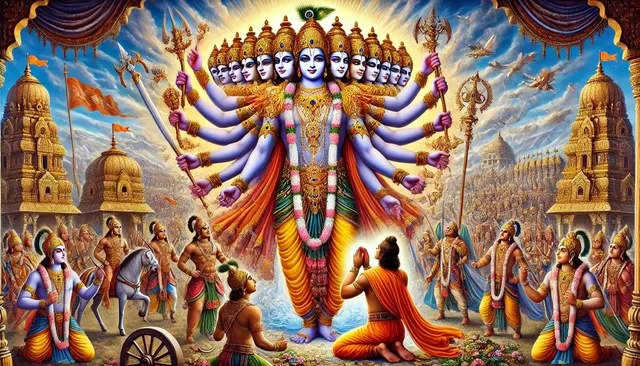The Teachings of Lord Krishna in the Bhagavad Gita 📜

The Bhagavad Gita, often referred to simply as the Gita, is a 700-verse Hindu scripture that is part of the Indian epic Mahabharata. It is a sacred text of the Hindu religion, consisting of a conversation between Prince Arjuna and the god Krishna, who serves as his charioteer.
Setting the Scene 🎭
The dialogue takes place on the battlefield of Kurukshetra just before the start of a great war. Arjuna is filled with doubt and moral dilemma about fighting in the battle, and it is in this moment of crisis that Krishna imparts his divine wisdom.
Key Teachings of Krishna 🕉️
1. The Nature of Self and Reality 🧘♂️
Krishna explains that the true self is eternal and indestructible, beyond the physical body. This self (Atman) is not born, nor does it die.
"The soul is neither born, and nor does it die at any time. It does not come into being, grow, or perish. The soul is eternal, imperishable, and timeless, and is never terminated when the body is terminated." - Bhagavad Gita 2.20
2. Duty and Righteousness (Dharma) ⚖️
Krishna advises Arjuna on the importance of performing one’s duty (dharma) without attachment to the results. This is the path of selfless action (Karma Yoga).
"You have a right to perform your prescribed duties, but you are not entitled to the fruits of your actions. Never consider yourself the cause of the results of your activities, nor be attached to inaction." - Bhagavad Gita 2.47
3. The Paths to Spiritual Realization 🌄
Krishna describes several paths to spiritual realization, including:
- Karma Yoga (Path of Selfless Action)
- Bhakti Yoga (Path of Devotion)
- Jnana Yoga (Path of Knowledge)
"Whatever you do, whatever you eat, whatever you offer or give away, and whatever austerities you perform—do that as an offering to Me." - Bhagavad Gita 9.27
4. Devotion and Surrender 💖
Krishna emphasizes the importance of devotion and surrender to God as the ultimate path to liberation (Moksha).
"Abandon all varieties of religion and just surrender unto Me. I shall deliver you from all sinful reactions. Do not fear." - Bhagavad Gita 18.66
5. The Vision of the Universal Form 🌌
In one of the most profound moments of the Gita, Krishna reveals his universal form (Vishvarupa) to Arjuna, showcasing his divine power and the interconnectedness of all existence.
"Behold, O Arjuna, My hundreds of thousands of divine forms, multicolored like the sea." - Bhagavad Gita 11.5
Conclusion 🎇
The Bhagavad Gita's teachings are timeless and universal, offering profound wisdom on the nature of life, duty, and spirituality. Through his discourse with Arjuna, Lord Krishna provides a guide for living a life of righteousness, devotion, and inner peace.
The Gita remains a cornerstone of Hindu philosophy and spirituality, inspiring millions around the world with its enduring message of love, duty, and the eternal truth.
Congratulations, your post has been upvoted by @upex with a 55.75% upvote. We invite you to continue producing quality content and join our Discord community here. Visit https://botsteem.com to utilize usefull and productive automations #bottosteem #upex
Downvoting a post can decrease pending rewards and make it less visible. Common reasons:
Submit